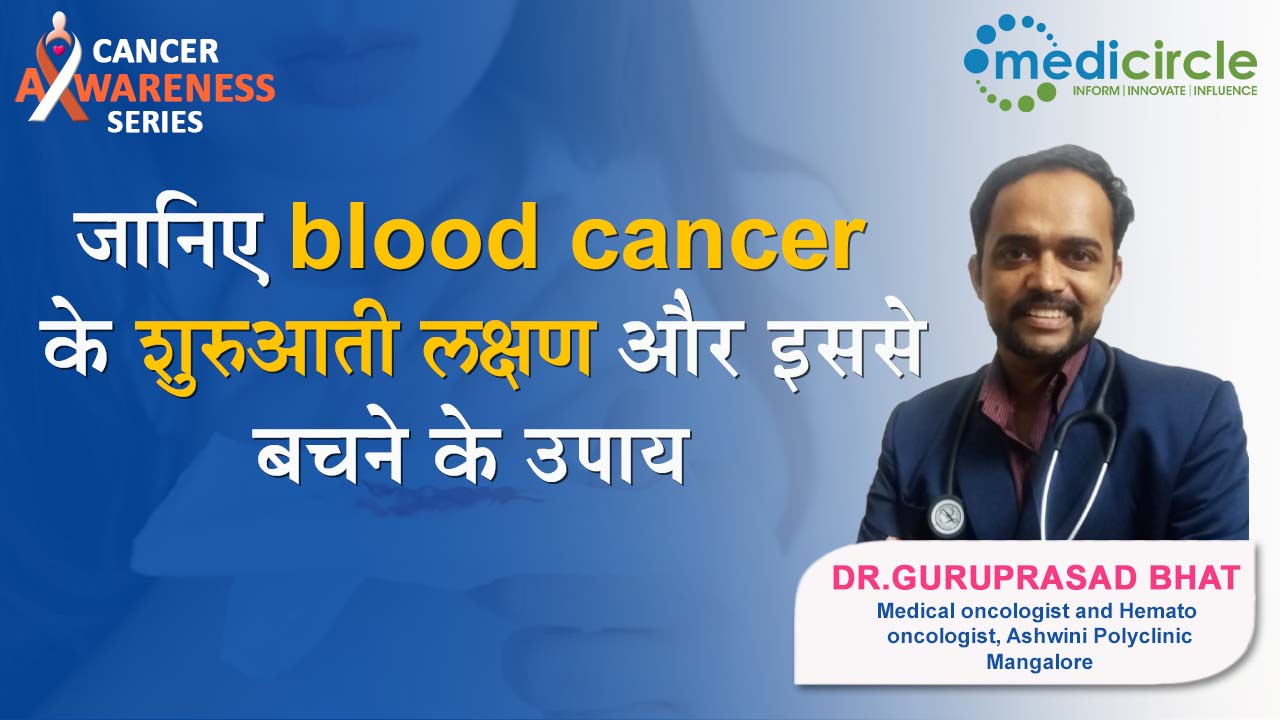Dr. Guruprasad Bhat is a Medical oncologist and haemato-oncologist at Ashwini polyclinic, Mangalore. For the past 11 years, he has been working in this field.
Dr. Guruprasad begins, “Cancer is abnormal cell growth. Blood cancer arises from the bone marrow where blood production occurs. There are three types of blood cancer – Leukemias, Lymphomas, and Myelomas. Each cell has its lifespan and if they grow beyond that then that causes cancer.”
Signs and symptoms of blood cancer
- Fever
- Chills
- Weight loss
- Easy fatigability and anemia
- Lymphoma – Swelling in the neck, armpit, and sometimes in the abdomen also.
- Small patches in arms and legs because of excessive bleeding
- Joint pain
Children hardly show any symptoms of blood cancer
Preventive measures
-
Maintain a healthy lifestyle (healthy eating and physical exercises)
-
Avoid unnecessary exposure to radiation (CT scan, PET scan)
-
Chemicals like benzene can produce blood cancer
How do doctors treat blood cancer?
First doctors have to make the correct diagnosis because symptoms are a bit common. For this, doctors do a general examination and look for signs and symptoms. Further tests like Complete blood count (CBC), WBC, platelets count, lymph nodes biopsy, and bone marrow aspiration biopsy (not in all cases). Once it is confirmed, they need to do subclassification. IHC, PCR, and Flow cytometry are some tests that help determine the subtype of cancer by looking for unique markers.
If any of you is having any kind of symptoms, visit the doctor, they will do a basic preliminary test to diagnose and then this decides the further investigation.
The severity of blood cancer
Dr. Guruprasad informs, “The severity of cancer depends on the stage and subtype of cancer. Overall Hodgkin’s lymphoma has a good prognosis (88%). Non-Hodgkin’s aggressive lymphoma can be controlled by 75%. And Myeloma roughly around 60% can be controlled.
Blood cancers are better curable as compared to other cancers. It has a higher percentage of survival rate. We need more awareness programs so that people can be early diagnosed. Since early diagnosis has a better outcome.”
FAQs
1. Can blood cancer patients live normal life after the treatment?
Yes
2. Does blood cancer spread very quickly?
It depends on the subtype of cancer.
3. What is the average age group for getting blood cancer?
You can get blood cancers across all ages. Acute leukemias are seen mostly in children, Hodgkin’s and Non-Hodgkin’s are more prevalent in less than 60 years and Chronic leukemias are seen in more than 60 years. 25% of cancers in children are acute leukemias.
(Edited by Renu Gupta)

 In India, blood cancer has been among the most common causes of death with an incidence of over one lakh people diagnosed every year with a form of blood cancer such as Lymphoma, Leukemia, and Multiple Myeloma. Let’s hear What experts have to say about that.
In India, blood cancer has been among the most common causes of death with an incidence of over one lakh people diagnosed every year with a form of blood cancer such as Lymphoma, Leukemia, and Multiple Myeloma. Let’s hear What experts have to say about that. 




.jpeg)







.jpg)






.jpeg)





.jpg)




.png)



